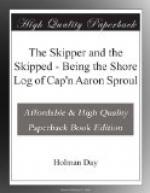From shore to shore
Lines from A mariner’s adventures
The Life Story of the Gallant Captain Aaron Sproul
Written by His Affectionate Wife
“You can put down what’s true,” he said, continuing a topic that they had been pursuing, “that boxin’ the compass and knowin’ a jib down-haul from a pound of saleratus ain’t all there is to a master mariner’s business, not by a blamed sight. Them passuls of cat’s meat that they call sailormen in these days has to be handled,—well, the superintendent of a Sunday-school wouldn’t be fit for the job, unless he had a little special trainin’.”
Louada Murilla, the point of her pencil at her lips, caught a vindictive gleam in his eyes.
“But it seems awful cruel, some of the things that you—you—I suppose you had to do ’em, Aaron! And yet when you stop and think that they’ve got immortal souls to save—”
“They don’t carry any such duffle to sea in their dunnage-bags,” snapped the skipper. “Moral suasion on them would be about like tryin’ to whittle through a turkle’s shell with a hummin’-bird’s pin-feather. My rule most generally was to find one soft spot on ’em somewhere that a marlin-spike would hurt, and then hit that spot hard and often. That’s the only way I ever got somewhere with a cargo and got back ag’in the same year.”
“I suppose it has to be,” sighed his wife, making a note. “It’s like killing little calves for veal, and all such things that make the fond heart ache.”
The Cap’n was “leaving” the grimy pages of a log-book. He paused over certain entries, and his face darkened. There was no more vindictiveness in his expression. It was regret and a sort of vague worry.
“What is it, Aaron?” asked his wife, with wistful apprehensiveness.
“Northin’,” he growled.
“But I know it’s something,” she insisted, “and I’m always ready to share your burdens.”
Cap’n Sproul looked around on the peace of his home, and some deep feeling seemed to surge in his soul.
“Louada Murilla,” he said, sadly, “this isn’t anything to be written in the book, and I didn’t ever mean to speak of it to you. But there are times when a man jest has to talk about things, and he can’t help it. There was one thing that I’ve been sorry for. I’ve said so to myself, and I’m goin’ to say as much to you. Confession is good for the soul, so they say, and it may help me out some to tell you.”
The horrified look on her face pricked him to speak further. ’Tis a titillating sensation, sometimes, to awe or shock those whom we love, when we know that forgiveness waits ready at hand.
“There was once—there was one man—I hit him dretful hard. He was a Portygee. But I hit him too hard. It was a case of mutiny. I reckon I could have proved it was mutiny, with the witnesses. But I hit him hard.”




